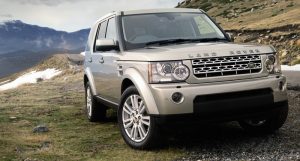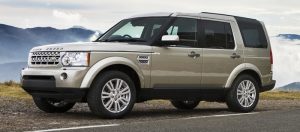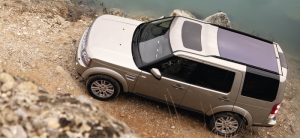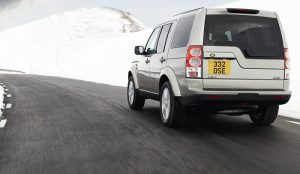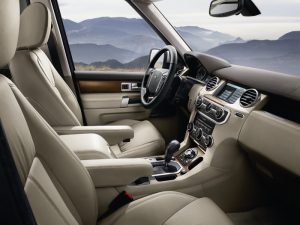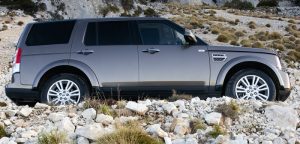The new Land Rover LR4 – the most capable Land Rover ever
- LR4 – new generation of Land Rover’s versatile SUV, introducing a new engine, improved dynamics and fresh design
- Refined, efficient and powerful new LR-V8 5.0L direct injection engine, Impressive 375 lb/ft torque and 375 bhp
- ULEV2 compliant
- On-road dynamics transformed by comprehensive chassis system developments and a new super-smooth 6-speed adaptive transmission
- Updates to Land Rover’s award-winning Terrain ResponseTM system reinforce class-leading all-terrain performance
- Fresh exterior design includes smoother new front end and revised lights, including LEDs
- All-new interior design delivers a more premium and functional five and optional seven-seat space
- User-friendly new features include available Surround Camera system, Gradient Release Control, Tow Assist, available Automatic High Beam Assist, and Keyless Entry, Push Button start.
The new, fourth generation of Land Rover’s supremely versatile SUV gains a new name – Land Rover LR4 – to go with its powerful and highly efficient new LR-V8 engine, fresh exterior identity and more premium cabin. The class-leading breadth of capability is extended even further with dynamic improvements for both on-road and off-road driving, and Land Rover has added a battery of user-friendly new technologies and features.
“The outgoing LR3 has well over 100 international awards to its name. But for the new LR4 we’ve found ways to improve virtually every aspect of the vehicle’s design and engineering – some subtle, some major. New design signals comprehensive engineering change under the skin,” says Phil Popham, Land Rover Managing Director.
Star billing on the LR4 goes to the highly efficient and refined new LR-V8 direct injection engine. This delivers 25% more power and 19% more torque than the previous 4.4-liter engine. The power and torque are both accessible across the entire rev range, to deliver immediate throttle response and effortless cruising ability, giving a 0-60 mph time of 7.5 seconds (0-100km/h in 7.6 seconds.)
Land Rover’s engineers have also transformed the LR4’s on-road ride and handling, and even improved on the much acclaimed all-terrain capabilities of its predecessor. The comprehensive changes include new suspension components, revised steering, larger brakes, improved traction control, and enhancements to the award winning Terrain ResponseTM system, which helps optimize the vehicle for virtually all on-road or off-road driving situations.
The iconic exterior design has been updated, most obviously with smoother and simpler surfaces at the front, including a new, more aerodynamic bumper. The sportier new lights help give the vehicle new character, and include LED technology front and rear. The sleek new front headlights include available ‘High Beam Assist’, automatically switching on or off the high beam, as conditions require.
Aerodynamic changes to the front end, with the revised front lower chin spoiler and new front wheel deflectors, help to reduce drag by increasing underfloor airflow, and LR4 is fitted with new 19-inch wheels and tires optimized for rolling resistance and improved tire wear.
The interior is completely redesigned, with a transformed dash and center console, new seats and an array of new, user friendly features.
“The new interior not only has a much more premium look and feel, it’s also gained improvement to its functionality. The new console inclines towards the driver, the switchgear and controls fall more readily to hand, and new LED ambient lighting helps make the cabin a more pleasant and more easily used space after dark. We’ve made the interior environment more premium too, with smoother surfaces, softer materials and close attention to critical details such as stitching,” says Gerry McGovern, Land Rover Design Director.
New features available for the LR4 include a portable audio interface, available HD Radio, a new available five-camera ‘surround’ system, for easier parking and towing, and a new key system which offers Keyless Entry and Push Button start.
“The changes and upgrades for LR4 transform many aspects of the previous generation, at the same time enhancing the flexibility and versatility for which this vehicle is famous. It can carry huge loads in its spacious interior, climb mountains, cruise across continents, haul trailers* or transport up to seven family and friends in comfort. I can’t think of a more versatile vehicle anywhere,” says Phil Popham. *
Maximum trailer weight with brakes; 7716lbs (3500 kg)
All new, LR-V8 5.0L direct injection engine.
The LR4’s new 5.0-liter LR-V8 is optimized for a balanced combination of performance and efficiency, thanks to its wealth of new features and industry firsts.
Designed entirely in-house by Jaguar Land Rover powertrain engineers, the
LR-V8 5.0L is one of the most advanced engines ever built. The new LR-V8 develops 375 bhp and 375 lbs/ft torque, bettering the previous 4.4-liter V8 for power and torque by 25 percent and 19 percent respectively. Yet when it comes to emissions the engine meets the stringent American ULEV2 (ultra low emissions vehicle) regulations.
Direct injection – increased power and torque with optimized emissions
A key feature of the new LR-V8 is an industry first, centrally-mounted, multi-hole, spray-guided fuel injection system, delivering fuel at a pressure of up to 150bar (2175 psi) directly to the cylinder.
Fuel is delivered by twin, high pressure fuel pumps driven via an auxiliary shaft in the all new engine block. Delivery of fuel direct to the cylinder has substantially contributed to improved low speed dynamic response which is particularly useful off-road while adding to driving pleasure on-road. The charge cooling effects of the direct injection fuel system have allowed the compression ratio to be raised to 11.5:1.
New variable camshaft timing system boosts engine torque, saves energy
A new type of variable camshaft timing system (VCT) introduces another industry first. The four VCT units are activated by the positive and negative torques generated by opening and closing the intake and exhaust valves, instead of by oil pressure. As a result the engine oil pump has been reduced in size, saving energy and improving engine efficiency.
VCT units work independently on all four camshafts and timing is optimized by the engine control unit for torque, power and economy at every point in the engine’s speed range.
The response rate of the new VCT units is 25 percent higher than before, and therefore delivers a more immediate engine response to the driver’s demand.
The new engine has also been optimized for low-end torque, making it possible to activate the lock-up clutch of the ZF HP-28 automatic transmission at lower speed. This reduces ‘slip’ in the hydraulic torque converter benefiting both fuel consumption and CO2 emissions. The higher torque at lower rpm also enables longer gearing for more economical cruising.
The LR4 incorporates several other energy saving features too. At standstill, the idle speed of the V8 has been reduced from 700rpm to 600rpm yielding fuel savings without compromising refinement. An Intelligent Power Management System includes smart regenerative charging, so whenever possible the alternator charges the battery when it is most economical to do so, such as when the car is coasting rather than accelerating.
Strong and compact
The new LR-V8 engine is built around a stiff, all new, aluminum block with cast-in iron liners and cross-bolted main bearing caps, to reduce noise, vibration and harshness. For the first time at Land Rover, the blocks are high pressure die-cast rather than sand-cast, providing a superior finish and dimensional greater accuracy. The engine also has aluminum heads, with four-valves per cylinder and a strong, spheroidal-graphite cast-iron crankshaft with steel connecting rods. The cylinder heads and block are manufactured using recycled aluminum alloy for the first time, thus reducing the environmental impact of manufacturing the new engine.
The new LR-V8 is also more compact than its predecessors. Overall engine length has been reduced through relocation of the oil pump within the engine architecture.
LR-V8 5.0L naturally aspirated engine in short
375 bhp and 375lbs/ft torque
25 percent more power, 19 percent more torque than the existing 4.4-liter
Meets ULEV2 emissions regulations
Highly efficient multi-hole central spray-guided direct injection – industry first
Torque-actuated variable camshaft timing on all four cams – V8 engine industry first
Camshaft profile switching
Variable length inlet manifold optimizes power and torque
Reverse cooling improves engine efficiency and speeds cabin warm-up.
Class-leading, low-friction design features
Lightweight construction uses recycled materials
15,000 mile (24,000 km) service intervals
The new LR-V8 engine has been developed by a joint Jaguar Land Rover engineering team, with base characteristics designed from the onset with the requirements of both brands in mind. High levels of torque and fast response from low revs perfectly suits both Jaguar and Land Rover DNA. The Jaguar version, the AJ-V8 Gen III, was recently launched in the new XF.
Although the basic architecture of both engines is the same, the Land Rover version has a number of special developments. The LR-V8 has a deeper, pressure die-cast sump to accommodate the extreme tilting angles that Land Rover vehicles can be subjected to during all-terrain driving. The LR4’s LR-V8 is also fitted with a mechanical cooling fan and, for packaging reasons, the inlet manifolds have been designed especially for the vehicle, while achieving the desired levels of noise vibration and harshness (NVH).
For the Land Rover version, belt drives are waterproofed, as are the alternator, air conditioning compressor, power steering pump and starter motor. The engine is also tuned specifically to allow for the greater demands made on the LR4, particularly for towing and all-terrain driving.
Responsive new transmission
The LR-V8 is mated to the revised and super-smooth ZF HP28 6-speed automatic transmission. Its characteristics have been optimized by Land Rover engineers to provide class-leading response, with rapid and refined shifts. The dramatic enhancement of both power and torque low down the rev range on the new engine have made it possible to actuate the transmission’s lock-up clutches much earlier in each gear, reducing slip through the hydraulic torque converter, so helping with the improvements in both efficiency and CO2 emissions.
Dynamics transformed
Major dynamic advances introduced for the LR4 include revised suspension architecture, improved steering, larger brakes and enhanced versions of Land Rover’s award-winning Terrain ResponseTM and Hill Descent Control systems.
The list of changes starts with new suspension knuckles, designed to reduce the separation between the suspension roll center and the vehicle’s center of gravity (reduction of 1.65 inch (42mm) at the front and 2.44 inch (62mm) at the rear). This dramatically reduces the vehicle’s natural body movements when cornering. These roll rates are further controlled by a stiffer and larger anti-roll bar.
In addition, new bushings and new front and rear dampers enhance ride quality.
The variable ratio steering rack is revised, complementing the improved ride quality by improving center line stability at high speed cruising and slightly increasing sensitivity at higher lock angles. This enhances the sense of driver involvement in high-speed maneuvers, and also increases precision for low speed control and off-roading.
The redesigned front bumper also helps improve steering feel, as its new front wheel deflectors help reduce aerodynamic lift at the front of the vehicle by up to 50% at higher speeds.
Increased stopping power
A new, larger brake system has been introduced to cater to the LR4’s enhanced performance and to improve braking feel. This new system is inspired by the four-piston, opposed-caliper performance system derived from the Range Rover Sport. It employs a 14.2-inch (360mm) ventilated front disc with a new, cast iron twin-piston sliding caliper – which serves to reduce the size of the front brake package while preserving its stiffness, which in turn helps achieve excellent pedal feel.
At the rear, a single piston sliding caliper, now manufactured in aluminum to help reduce vehicle weight., operates on a 13.8-inch (350mm) ventilated disc,. An additional advance to the braking system is the new emergency brake light function. When the vehicle undertakes severe or emergency braking, the brake lights flash, to reduce the risk of rear end collisions.
More control in the corners
A refinement to the Dynamic Stability Control system helps automatically slow the vehicle if taking a corner too fast, enhancing driver control. The system operates according to steering inputs from the driver. In extreme cases, automatic braking intervenes to reduce the vehicle speed, with the braking pressure level applied according to the steering inputs.
Updates for award-winning Terrain ResponseTM and Hill Descent Control
For LR4, Land Rover’s award-winning Terrain ResponseTM system gains new features and refinements, further extending the vehicle’s all-terrain capability. Terrain ResponseTM optimizes the vehicle set-up for virtually all on-road or off-road driving situations, with five different settings to suit different terrains:
General driving
Grass/gravel/snow
Sand
Mud and ruts
Rock crawl
For soft sand – one of the most power-hungry surfaces – ‘sand launch control’ has now been introduced, which makes for noticeably easier drive-away. New, speed-dependent wheel-slip targets for the traction control system permit only very limited wheel-slip, helping to prevent the wheels digging down into the sand.
New for LR4, revisions to the rock crawl program apply low level brake pressure when the vehicle is in first or reverse gear at speeds below 3 mph (5km/h). This low-level brake force reduces the vehicle’s roll tendency and the intervention of the traction control system, giving a more composed drive through rocky terrain.
Land Rover’s much-acclaimed Hill Descent Control system is enhanced on LR4 with the addition of Gradient Release Control. This inhibits the initial rate of acceleration when descending very steep inclines, to increase control when braking is released at extreme angles.
The system activates automatically whenever Hill Descent Control is engaged, temporarily maintaining brake pressure after the driver releases the brake pedal. It then progressively eases braking pressure to control vehicle momentum and acceleration. Once the vehicle’s target off-road speed is achieved, Hill Descent Control operates to take the vehicle to the bottom of the slope in its customary composed manner.
A new face on a distinctive design
The Land Rover LR4 has evolved a distinct design heritage over 20 years and four generations of iconic, instantly recognizable vehicles. LR4 inherits the clean lines of the previous generation, but now subtly updated and given a more premium, more contemporary look.
Smoother, simpler surfaces are employed at the front, giving the vehicle its new character, emphasized by sportier looking front lights, with new LED position lamps configured in a unique, signature stepped profile around the main light units. New lights are also introduced at the rear of the vehicle, incorporating LED stop, tail and indicator technology.
The new front bumper has a larger cooling aperture to accommodate the new engine’s greater power outputs. Cleverly, the larger bumper actually improves vehicle aerodynamics by reducing drag, thanks to its innovative front wheel deflectors that help smooth the airflow from the front bumper around the front wheels.
A new, twin seven-spoke 19″ wheel design is introduced on the LR4 to complement the existing seven-spoke 19″ wheel and, for the first time, a new striking, 10-spoke 20″ wheel is available as a factory-fit option.
Three new paint colors complete the exterior changes for LR4 – Nara Bronze, Bali Blue and Ipanema Sand.
All-new interior
The new interior for LR4 combines smooth, flowing surfaces with significant reduction in the complexity and number of controls. It provides a much softer, more premium all-round interior ambience, but still in keeping with the vehicle’s signature architectural theme.
The new console is now inclined towards the driver, improving visibility and access to the controls. The Terrain ResponseTM control is now more prominently located at the front of the center console, making way for the cup-holder in a more accessible position, mid-way along the console.
All models feature a new steering wheel, with revised switch layout for driver information, remote audio controls, cruise control and heated steering wheel.
A choice of natural-finish woods, along with stitched and wrapped fascia, door casings and center console, add to the crafted bespoke feel. There are also two new interior contrast colors, a mid-tone Nutmeg and a darker Arabica, complementing the existing Almond light interior colorway.
New seating is introduced for rows one and two, with a new, extended front seat cushion profile to improve support and seating comfort and, for the first time, the front seats feature height-adjustable head restraints in place of the traditional seat mounted grab handles. HSE vehicles specified with the Premium Leather pack also feature electrically adjustable seat bolsters, allowing front occupants to tailor their seating’s support. For convenience, the electric seat memory controls are relocated to the door casing.
New ambient lighting adds the finishing touch to the interior, with the introduction of white LED’s to cast subtle halos around the metal-plated interior door handles and pockets. The fascia and center console area, complete with soft-stitching, and switchgear highlighted in “Noble” finishers, also benefit from the interior mood lighting when vehicle lights are on.
Technology made simple
Inside and out, the LR4 gains a raft of relevant new technology, to improve the driving experience.
The navigation system adopts an easy-to-use menu structure which now also features ‘towards guidance’. This supplements the junction map and icon-based information with details of the actual road signage viewed by the driver along the route.
The new available Portable Audio Interface allows connectivity to an array of personal audio storage devices, USB sticks and MP3 players, enabling the various devices’ functions to be accessed and controlled via the fascia-mounted touch-screen system. One of the connectivity ports is a dedicated Apple i-PodTM point made exclusively by Land Rover, for continued functionality in extreme driving conditions, by helping to prevent the device coming loose from the socket.
A new 5-inch Thin Film Transistor (TFT) driver information LCD screen is also introduced with LR4. Sitting within the re-designed instrument cluster, the message center display ensures key information is communicated in a clean, simple and user-friendly manner.
And a purer, crisper radio sound is now available thanks to the introduction of HD Radio in the US. Along with the fine listening experience, comes additional features such as song title and artist information.
Cutting edge user-friendly technologies
Outside the vehicle, convenient and relevant new systems enhance safety and security.
The new front headlights incorporate available Automatic High Beam Assist technology. This can automatically switch on high beam headlights where external light levels are below the system’s threshold. Importantly, the system is also designed to detect preceding and approaching traffic, and in a split second will automatically switch back to low beam to avoid dazzling others.
No less than five digital cameras make up the new available surround camera system, relaying to the touch-screen a near 360-degree view. The cameras, which support easier parking, towing and off-road maneuvering, function immediately as the vehicle is started, and have options for selecting and zooming in to assist with close quarter parking and with towing.
The ‘tow assist’ function (selected from the touch screen menu) helps perform accurate towing maneuvers. The wide fields of views on the side cameras give a clear view of the reversing trailer: the images are electronically manipulated to provide an undistorted view, with guide lines overlaid on the rear camera image to illustrate both the vehicle and trailer’s trajectory.
Specific characteristics such as type of trailer, number of axles and width guides can be fed into the system to enhance the system outputs.
Another towing aid, Trailer Stability Assist, detects trailer oscillations by monitoring key vehicle behaviors, such as uninvited steering movements and slight vehicle swing in response to trailer behavior. In these circumstances, the system can initiate engine torque reduction and braking interventions to bring the towing back under control.
And finally, the LR4’s sophisticated new remote key offers available Keyless Entry and Push Button start.

